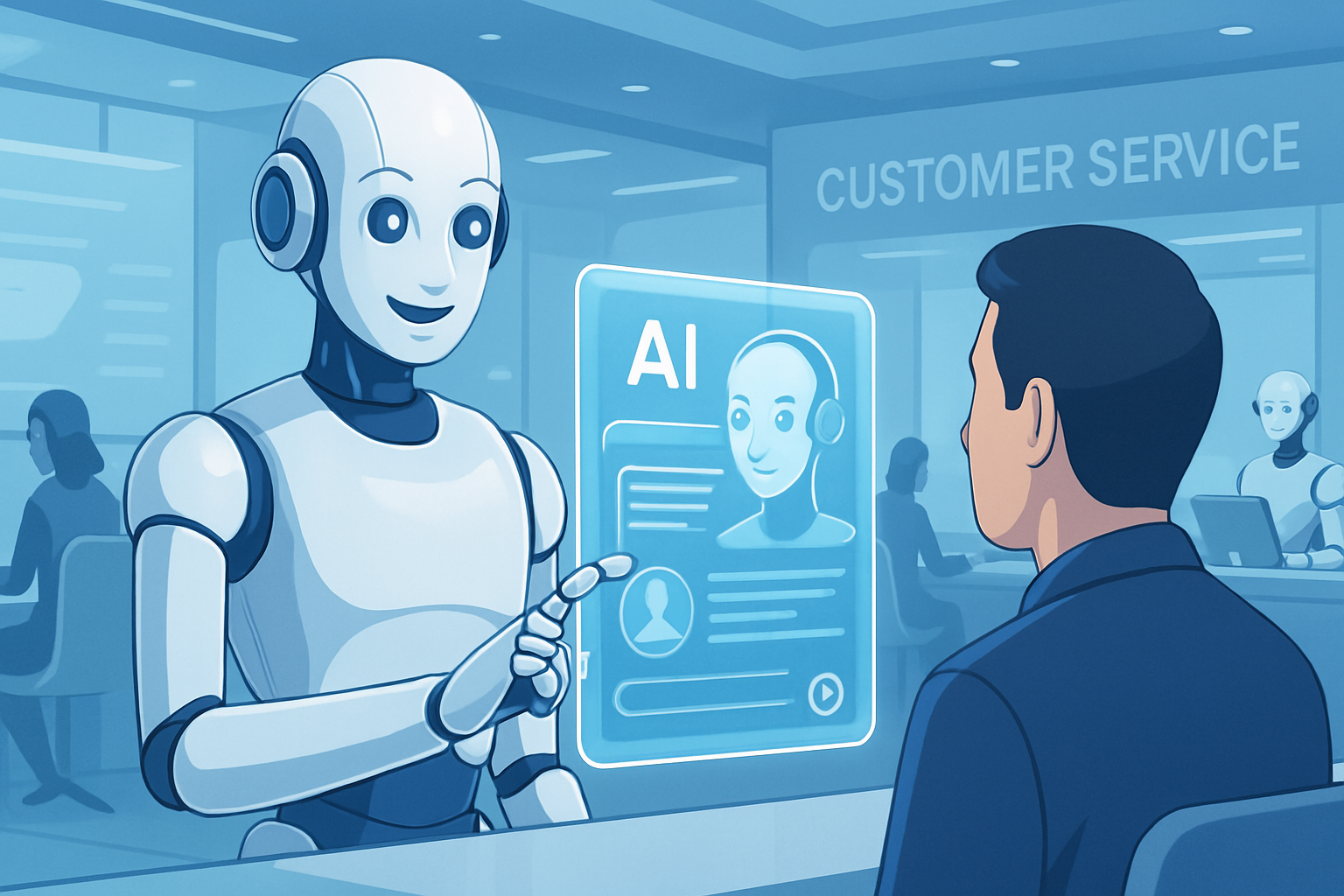Article 9: AI in Customer Service: Enhancing Experience & Efficiency in 2025
Meta Title: AI in Customer Service (2025): Benefits, Tools & Future Trends
Meta Description: Discover how AI is transforming customer service with chatbots, personalized support, and predictive analytics. Explore benefits, top AI tools, and future trends for 2025.
Target Keywords: AI customer service, AI chatbots, AI support tools, future of customer service, AI customer experience
The AI-Powered Helpdesk: Transforming Customer Service in 2025
Customer service is the cornerstone of any successful business. In 2025, Artificial Intelligence (AI) is no longer a futuristic concept in this domain but a powerful, present-day force revolutionizing how companies interact with their customers. From intelligent chatbots providing instant support to AI-driven analytics offering deep customer insights, AI is enhancing experiences, improving efficiency, and reshaping the future of customer service.

How AI is Making a Difference in Customer Support
- Intelligent Chatbots & Virtual Assistants:
- Functionality: AI-powered chatbots can handle a vast range of customer inquiries 24/7, understand natural language, provide instant answers to common questions, guide users through processes, and even escalate complex issues to human agents when necessary.
- Impact: Reduces wait times, provides immediate support, frees up human agents to handle more complex or sensitive issues, and improves overall customer satisfaction.
- Examples: Intercom, Zendesk Answer Bot, Drift, Ada.
- AI-Powered Email Management & Ticketing:
- Functionality: AI can automatically categorize and prioritize incoming support emails and tickets, route them to the appropriate agent or department, and even suggest relevant responses or knowledge base articles.
- Impact: Streamlines ticket management, ensures faster response times, and improves agent productivity.
- Tools with these features: Zendesk, Salesforce Service Cloud, Freshdesk.
- Personalized Customer Experiences:
- Functionality: AI analyzes customer data (past interactions, purchase history, browsing behavior) to provide personalized recommendations, tailored support, and proactive assistance. It can anticipate customer needs before they even arise.
- Impact: Increases customer loyalty, improves engagement, and makes customers feel understood and valued.
- Predictive Analytics for Proactive Support:
- Functionality: AI algorithms can analyze patterns in customer behavior and feedback to predict potential issues or churn risks. This allows businesses to proactively reach out and offer solutions or support.
- Impact: Reduces customer frustration, prevents problems from escalating, and improves customer retention.
- Sentiment Analysis:
- Functionality: AI tools can analyze text and voice communications (emails, chat logs, social media comments, call recordings) to gauge customer sentiment (positive, negative, neutral) in real-time.
- Impact: Helps businesses understand customer satisfaction levels, identify areas for improvement, and quickly address negative feedback before it escalates.
- Agent Assist & Knowledge Management:
- Functionality: During live interactions, AI can provide human agents with real-time suggestions, relevant knowledge base articles, or customer history to help them resolve issues more quickly and effectively.
- Impact: Empowers agents, reduces resolution times, and ensures consistent service quality.
- Automated Quality Assurance & Performance Monitoring:
- Functionality: AI can analyze customer interactions (like call recordings or chat transcripts) to assess agent performance against quality metrics, identify coaching opportunities, and ensure compliance.
- Impact: Improves agent training, ensures consistent service standards, and helps identify top-performing strategies.
Benefits of Integrating AI into Customer Service
- Enhanced Customer Satisfaction: Faster responses, 24/7 availability, and personalized support lead to happier customers.
- Increased Efficiency & Productivity: Automating routine tasks frees up human agents for more complex work.
- Cost Reduction: AI can handle a large volume of inquiries at a lower cost than human agents alone.
- Scalability: AI solutions can easily scale to handle fluctuating volumes of customer interactions.
- Data-Driven Insights: AI provides valuable data on customer behavior, preferences, and pain points, enabling businesses to make more informed decisions.
Challenges to Consider
- Lack of Human Touch & Empathy: While AI is becoming more sophisticated, it can still lack the genuine empathy and nuanced understanding that human agents provide, especially in sensitive situations.
- Integration Complexity: Integrating AI tools with existing CRM and support systems can be complex.
- Data Privacy & Security: Handling customer data with AI requires robust security measures and compliance with privacy regulations.
- Training & Maintenance: AI models need to be trained and continuously updated to remain effective and avoid bias.
- Customer Acceptance: Some customers may still prefer interacting with a human agent, especially for complex or emotional issues.
The Future of AI in Customer Service
The role of AI in customer service will continue to expand. We can expect more advanced conversational AI capable of handling even more complex interactions, hyper-personalization at every touchpoint, and AI-driven tools that empower human agents to become true customer advocates.
The ideal future likely involves a blended approach, where AI handles routine and high-volume interactions, while human agents focus on building relationships, solving complex problems, and providing empathetic support. This synergy will be key to delivering exceptional customer experiences in 2025 and beyond.
Leave a Reply